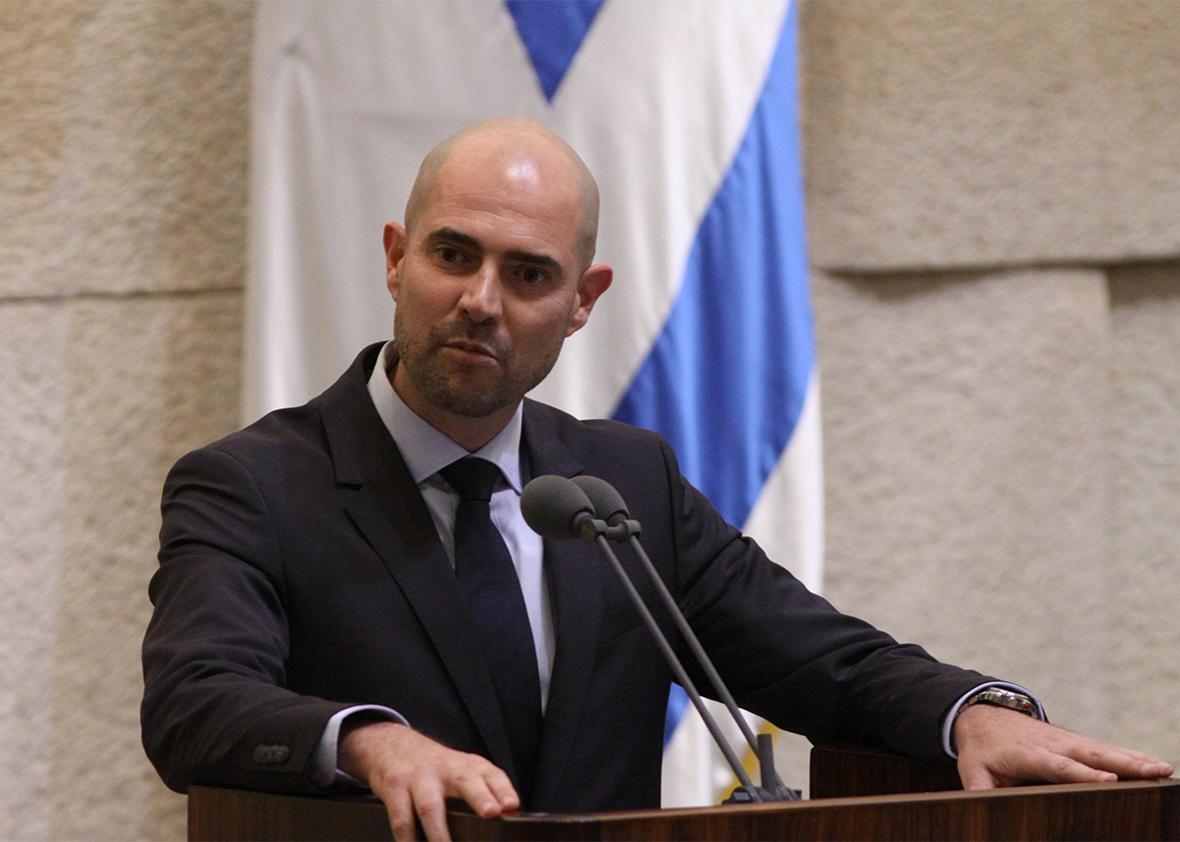Even for an assembly accustomed to spectacle, the maiden speech of Amir Ohana—the first openly LGBT Knesset member from Israel’s Likud Party—was unusual. After Ohana proclaimed that he was simultaneously “a Jew, an Israeli, a Mizrahi, a homosexual, a Likudnik, a security forces veteran, a liberal, and a free-marketer,” Prime Minister Benjamin Netanyahu went up to the podium to congratulate and laud him. This tribute quickly descended into a novel argument between Netanyahu and the opposition, essentially over which party is more accepting of LGBT members.
“Amir is the first clear and visible representative of the gay community who was elected in an open primary, that is, when he was completely out,” Netanyahu contended. “What about Nitzan Horowitz?” the opposition shouted, referring to a former representative of the left-wing Meretz Party. Their central committee chose him, Netanyahu said. When leader of the opposition Yitzhak Herzog asked about another former Meretz MK, Netanyahu conceded that Ohana was the first in Likud.
Ohana—a father of twins, Elah and David, with his partner, Alon—follows Horowitz, Uzi Even, and current Zionist Union lawmaker Itzik Shmuli as the Knesset’s fourth openly gay member—but he is the first to come from Israel’s right wing. Born in Be’er Sheva, in Israel’s south, to immigrants from Morocco, after six years in the Israeli military, Ohana spent a further six in Shin Bet, Israel’s domestic security service. Switching tracks to become a lawyer, Ohana was one of the founding members of the Likud’s LGBT caucus, Pride in the Likud, in 2011.
“This was the first time the right in Israel had addressed LGBT issues,” Ohana told me during an interview at his home in Tel Aviv. He says Pride in the Likud succeeded in changing the Likud Party platform to reflect a commitment to LGBT equality. “Within the party, we received an almost entirely positive reaction. I can count on one hand the negative reactions that said, ‘You don’t have a place in Likud. Go to Meretz.’ ”
In the last primary election, Ohana won the 32nd slot on the Likud list, which was reserved for a candidate from the Tel Aviv district. Likud won 30 seats in March 2015, which meant that he wasn’t elected to the Knesset, but when Silvan Shalom resigned in December, following multiple sexual harassment allegations, Ohana took his place.
In Israel, what is considered left and right on the political spectrum is largely defined by positions on national security and Palestinian statehood, so it is perfectly possible to be in favor of women’s or LGBT rights and hawkish on the two-state solution. (Ohana is a hawk himself, believing, as Netanyahu does, that since the Israeli-Palestinian conflict predates the Six Day War, the idea that it would end if Israel pulled out of the Palestinian Territories tomorrow is “wrong.”)
In Likud, the best example of this is Miri Regev, the current Israeli minister for culture and sport. She has referred to Sudanese asylum seekers as “a cancer in our body,” but she is also the most prominent pro-LGBT lawmaker in Likud, and she campaigned in the gay community during the March 2015 election. Similarly, Likud Defense Minister Moshe Ya’alon said in February 2015, “We should allow members of the [LGBT] community to conduct family life, including marriage.”
But whatever the pro-gay credentials of some in Ohana’s party, Likud is part of a governing coalition that is decidedly regressive on LGBT issues. Members of the ultra-Orthodox United Torah Judaism and Shas parties walked out of the chamber when Ohana made his maiden speech. “We are very concerned that he will work to advance initiatives regarding the homosexual community,” a senior UTJ source told Israel’s Channel 2. The ultra-Orthodox press barely reported the speech, if at all. During the election, the national-religious Jewish Home Party ran in opposition to same-sex marriage.
“We have a very tough coalition, LGBT-wise, but we do not know that the coalition will stay in this form for the whole four years,” Ohana said, referring to persistent rumors that Yitzhak Herzog will bring the center-left Zionist Union into the ruling coalition. “The prime minister has said as well that 61 seats is good, but more is better,” Ohana noted, adding that the coalition does not need a situation where every member has a veto. “If Herzog or other parties joined the coalition, it would reflect the Israeli people better than now.”
The makeup of the government has already led to opposition calls for Ohana to vote with them should they submit pro-LGBT bills to a vote. Shortly after Ohana’s maiden speech, Herzog said he hoped that “bills we put to a vote in the Knesset that concern the issue close to your heart, which is LGBT rights, will receive your support and that of the coalition.”
But Ohana is unlikely to break coalition discipline, as it is termed in Israel, particularly at a time when the government has such a narrow majority—just 61 members in a 120-seat assembly. “I would do my best and try and convince the coalition to accept [an opposition] bill if I think it’s good,” he said. “But when you are a team player, you have to know that sometimes you won’t succeed. Sometimes you win, sometimes you lose.”
